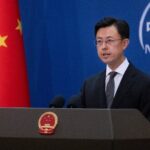Introduction
In a region already straining under the weight of escalating conflict, a key opportunity for diplomacy has collapsed. The much-anticipated nuclear negotiations between Iran and the United States, scheduled for June 15, 2025, in Muscat, Oman, have officially been canceled. Oman’s Foreign Ministry—acting as the official mediator—confirmed the decision just one day before the talks were set to begin. The cancellation, while disappointing, did not come as a shock to seasoned observers of Middle Eastern politics.
The breakdown came amid an explosive chain of events: Israel launched a sweeping military offensive targeting Iranian defense and nuclear infrastructure. Tehran retaliated with equal intensity. The timing of these strikes obliterated any remaining diplomatic goodwill, forcing Iran to withdraw from the discussions. This article explores the deeper layers behind the decision, Oman’s role, the reactions from both sides, and what the future might hold for nuclear diplomacy in the Middle East.
Oman’s Unique Role in U.S.–Iran Diplomacy
Oman has long functioned as a quiet but powerful diplomatic bridge between Iran and Western nations. Its neutral foreign policy, absence of overt geopolitical ambitions, and strong bilateral ties with both Washington and Tehran have made it a trusted platform for sensitive talks. It was in Muscat, after all, where early discussions leading to the 2015 Joint Comprehensive Plan of Action (JCPOA) were initiated.
Over the past year, Oman has once again stepped into the role of mediator, facilitating several rounds of indirect dialogue between Iranian and American officials. Foreign Minister Badr al-Busaidi led the charge, relaying proposals, counterproposals, and conditions between the two parties. The upcoming June 15 session was expected to be pivotal—possibly the closest both sides had come to reopening a formal nuclear accord since the U.S. withdrew from the JCPOA in 2018.
What Led to the Cancellation?
As tensions soared between Israel and Iran, the political environment became too volatile for diplomacy to continue. On June 13 and 14, Israel launched “Operation Rising Lion,” a multi-pronged attack on Iranian military and nuclear assets. Reports indicated that drone and missile strikes hit critical infrastructure sites in Natanz, Isfahan, and near Tehran—resulting in dozens of casualties, including high-ranking Iranian defense officials and nuclear scientists.
Iran responded forcefully, launching ballistic missiles and drones into Israeli territory. The tit-for-tat attacks marked one of the most intense direct confrontations between the two countries in recent years.
With missiles flying and public outrage boiling over, Iran’s government declared that it could not, in good conscience, engage in negotiations while its territory was under attack. Foreign Minister Abbas Araghchi criticized what he described as a “hostile and complicit silence” from the United States regarding Israel’s aggression. Iran interpreted this silence as a green light for Israel’s operations, and thus declared continued nuclear dialogue “meaningless under the present circumstances.”
Oman, caught in the crossfire, released an official statement on June 14:
“The Iran-U.S. talks scheduled to be held in Muscat this Sunday will not now take place. Diplomacy and dialogue remain the only pathway to lasting peace.”
U.S. and International Responses
The Biden administration expressed disappointment but emphasized its continued commitment to diplomacy. A senior U.S. official stated that Washington still hoped Tehran would return to the negotiating table “once tensions de-escalate.” While denying any direct involvement in Israel’s operation, the official also reiterated America’s unwavering support for Israel’s right to self-defense.
U.S. Ambassador Linda Pitt, addressing the United Nations, insisted the U.S. was not involved in planning or executing the Israeli strikes. “Our focus remains on preventing nuclear proliferation through peaceful means. We urge Iran to reengage in dialogue,” she said.
European officials, including EU High Representative for Foreign Affairs Josep Borrell and French President Emmanuel Macron, voiced concerns over the deterioration of diplomacy and called for immediate de-escalation. The European Union had previously been briefed on the Iran-U.S. talks by Oman and had expressed cautious optimism about potential progress.
Iran’s Domestic Calculations
Iran’s withdrawal from the talks was not purely a reaction to external aggression; it was also driven by internal politics. President Masoud Pezeshkian, elected on a centrist platform, had shown willingness to negotiate with the West, particularly on nuclear issues and sanctions relief. However, conservative factions within Iran’s power structure—including the Revolutionary Guard—strongly opposed any dialogue during wartime.
By backing out of the Muscat talks, the government may also have aimed to solidify national unity and respond to public anger over Israel’s attacks. In the days leading up to the cancellation, massive rallies were held across Iran, with protestors chanting against Western intervention and demanding retaliation.
A Growing Sense of Urgency
The collapse of talks has renewed fears of an unchecked Iranian nuclear program. Over the past year, Iran has increased uranium enrichment levels well beyond the limits established under the JCPOA. According to recent IAEA reports, Tehran is now enriching uranium to nearly 90% purity—a level suitable for weapons-grade material.
Without diplomacy, there is no mechanism to limit or monitor Iran’s nuclear activities. This reality has sparked concern not just in Israel and the United States, but across the broader international community.
Adding to the urgency is the growing regional instability. Oil prices surged by nearly 10% in the aftermath of the strikes. The Strait of Hormuz, through which one-fifth of global oil passes, has seen increased military activity from both Iranian naval forces and U.S. warships. Any prolonged conflict risks disrupting global trade and further destabilizing the world economy.
The Future of Nuclear Diplomacy
Though the June 15 talks are canceled, the door to diplomacy is not entirely closed. Oman remains committed to facilitating future dialogue, and both the U.S. and Iran have left room for potential re-engagement under different circumstances.
For talks to resume, several conditions will likely need to be met:
- A temporary ceasefire or de-escalation between Israel and Iran
- Public assurance from the U.S. that it supports diplomacy independently of Israeli military operations
- A willingness from Tehran to return to the negotiating table once national security concerns are addressed
There is also speculation that neutral third-party countries—like Switzerland or Qatar—might be brought in to supplement Oman’s mediation efforts.
Broader Implications for the Region
The cancellation has broader implications beyond the nuclear file. It signals a worsening of trust between Iran and the West and further complicates already fragile regional alliances. Countries like Saudi Arabia and the UAE, which had cautiously welcomed Iran’s diplomatic overtures in recent years, now find themselves reassessing their security postures.
Meanwhile, Israel’s preemptive strikes suggest that it is unwilling to wait for diplomatic solutions when it perceives existential threats. This mindset increases the risk of future flashpoints, especially if Iran continues its nuclear development without restraint.
The U.S., caught between its alliance with Israel and its desire to prevent another war in the Middle East, finds itself in a precarious balancing act. The failure of diplomacy at this moment adds strain to Washington’s broader regional strategy, particularly as it tries to pivot more attention to Asia and the Indo-Pacific.
Conclusion
The collapse of U.S.–Iran nuclear talks on June 15 marks a troubling milestone in an already volatile geopolitical landscape. While not necessarily the end of the road for diplomacy, it is a significant setback—one driven by military conflict, mistrust, and a rapidly narrowing window for peaceful negotiation.
Oman’s dignified role as a mediator remains respected, and there is hope that, once the dust settles, Muscat may once again host talks aimed at de-escalation and nuclear restraint. But for now, the silence in the negotiation room reflects not apathy, but the deafening noise of missiles, ideology, and unresolved grievances.
Whether diplomacy can be revived in time to prevent a full-scale regional war—and nuclear proliferation—is a question the world cannot afford to leave unanswered.






4x4qne